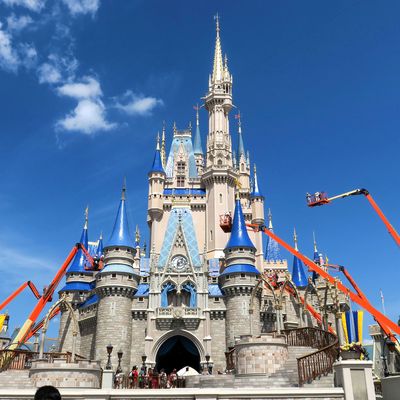
Adults with age-inappropriate Disney fixations, rejoice: The brand’s flagship resort in Orlando, Florida, is reopening today. Despite a massive local surge in COVID-19 cases, Walt Disney World will begin what CNN calls a “phased reopening,” beginning with its Magic Kingdom and Animal Kingdom attractions. EPCOT and Hollywood Studios will follow later in the month, assuming that Disney does not rethink its plans.
For Disney the company, Disney World is a crown jewel, a mawkish testament to the power of a brand. But magic does not cast itself. Someone has to wear the Mickey costume, or cater the Beauty and the Beast-themed wedding, or strap tired children into rides. That’s work, and the people who perform it are somewhat less than enthusiastic about the revivification of Disney World. Some say the company could place them in serious medical danger.
Actors’ Equity, the union representing theatrical workers in Disney’s parks, had asked the company to regularly test its members for COVID-19. But Disney didn’t comply. Instead, it decided to go ahead and reopen without Equity members, which deprives the union’s members of a chance to make income. On Thursday, the union filed a formal grievance against the company. “Since our public request that Disney test performers in the park, there have been more than 114,000 new coronavirus cases in Florida,” Mary McColl, the executive director of the Actor’s Equity Association, said in a press release. “Rather than agree to testing of performers, Disney has decided to retaliate against workers fighting for a safe workplace during this pandemic.”
Disney did sign agreements with other unions to permit those workers to return, the New York Times previously reported, and the company has distributed videos of workers saying they feel safe enough to get back on the job. “I feel safe because Disney has gone above and beyond what they needed to do,” one said. But Disney’s fight with Actors’ Equity follows years of worker complaints over low pay and exploitative conditions. Disney World workers face regular abuse from tourists who make the pilgrimage to the land of the Mouse. In 2019, the Orlando Sentinel reported, a French tourist “scratched an employee, elbowed her in the stomach and then pushed her” after a Winnie the Pooh ride ceased to function. Visitors have even sexually assaulted workers. In one case reported by the Sentinel, Disney gave a Venezuelan man three FastPasses for the Animal Kingdom after a worker said he repeatedly groped her breast.
In 2018, workers from Disney World and Disneyland in Anaheim, California, protested a Disney shareholder meeting over low pay. Though Disney decided to raise wages to $15 an hour by 2021, its park workforce still struggles to pay for expenses, as another Sentinel report laid out last year. Some go hungry; others sleep in their cars. Those workers stand to undergo further harm if economic circumstances force Disney to cut back its workforce — but it’s hard to believe that the company, which is worth over $100 billion, is so precarious that it must reopen parks as soon as possible.
Workers in Anaheim watch their peers in Orlando with concern. Cases in California are spiking too, and Disney’s plans for its Anaheim park remain somewhat unclear. Though the Downtown Disney district has begun a phased reopening, the rest of the park is still closed for now. The Coalition of Resort Labor Unions, which collectively represent around 17,000 Disney workers in California, recently organized a protest by car caravan. Like Actors’ Equity, they want regular testing, and Disney hasn’t agreed to their demands either.
“I’m okay with Disney opening. I just want it to be a safe return for us,” said Ines Guzman, who’s worked at the Disneyland Hotel for five years and belongs to Unite Here Local 11. “We work in the housekeeping department, and we’re really worried about those rooms. Are they going to disinfect those rooms before we go in there? Are they going to have more people there to help us clean?” Guzman also worried that Disney would rush housekeepers to turn over rooms, which might not give them enough time to clean and disinfect the space.
While tourists might be eager for their Disney vacations, Guzman is worried about her family. “At home I have children who depend on me,” she explained. “My mom is over the age of 60. I’m concerned. Because when people come out of the room, we don’t know, if they sneeze, if they have the COVID. We don’t know anything. We’re touching their personal stuff, whatever they left in there. We go in and we can get infected.” Infection probably isn’t what Disney wants visitors to contemplate when they return to the parks, fat wallets in tow. It’s not the stuff of fairy tales. But neither is working at Disney.






























